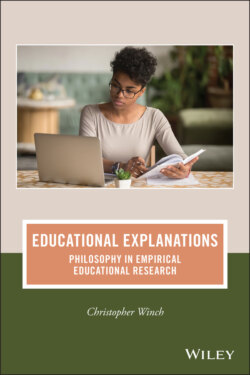Читать книгу Educational Explanations - Christopher Winch - Страница 33
Education Is Value-laden and Hence Cannot Be Studied Empirically in a Value-neutral Form
ОглавлениеThe final objection to EER relates to the fact (acknowledged and emphasised in this book) that educational practices are concerned with the expression and transmission of values considered to be desirable for educatees by educators. One may ask why this self-evident fact should pose a problem for the very possibility of EER (Clark 2011) as is sometimes claimed. Upon examination, it appears that there is a clear distinction to be made between a social phenomenon and value-laden practices: ‘As we have seen education is a good. Social phenomena are not… Second “education” being value-laden does not denote a range of empirical phenomena which is its proper domain as “social science” does’ (Clark 2011, p. 50). Consequently, according to Clark, educational practices cannot be studied as social phenomena. If this is so, then EER is clearly impossible, since it is the very attempt to do just that. However, the only plausible way in which one could arrive at such a conclusion would be if one held that social phenomena are by definition value-free. But only some conceptions of social science would be committed to such a view, notably those within the behaviourist tradition, or perhaps a form of hermeneutics that sees values excited within the imagination of the researcher in rather the same way as Hume envisaged ethical and aesthetic judgment to arise (see for example Hume [1757] (2008)). This is a way of conceptualising social phenomena which is rejected in this study, and there is little evidence that Clark himself subscribes to it either. By their nature, educational practices are value-laden. They are also phenomena in the world, albeit not ‘raw’ physical phenomena. An educational researcher may not identify with the values that are expressed in an educational practice, but s/he is entititled to explore what values are expressed in a practice whether or not s/he agrees with them.18
Needless to say, there are preconditions for any successful investigation of educational practices if one wishes to understand them. These are not always easy to obtain. First, the researcher has to recognise that what he regards as a good may not be by the participants in the researched practice. He cannot judge the value of the practice by his own standards if doing so entails that he rejects its character as an educational practice. Second, he will need, if this is the case, to have the patience and imaginative sympathy to try and understand what the values expressed and goods aimed for in such practices actually are, and how they relate to other values held within the society.19 Third, he will need to be able to look back on his own values and to see if what he has learned about the practice being studied tells him something about himself, the values that he espouses and the practices and the society in which he originates. This last requirement might seem strange. However, a researcher who is unable to develop in this way is one who is also unlikely to develop the sense of detachment and imaginative sympathy required by the first two conditions. In particular, such a researcher will lack the ability to make crucial connections between the attitudes and practices of his own society and that of the society or practices that he is trying to understand. None of these desiderata can be assumed to be easy to achieve. Nevertheless they are essential to successful EER.
